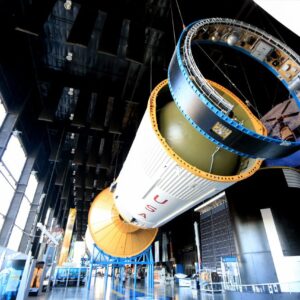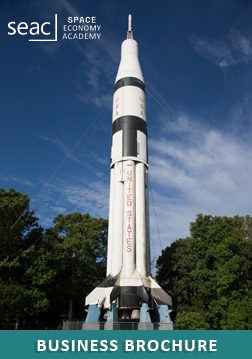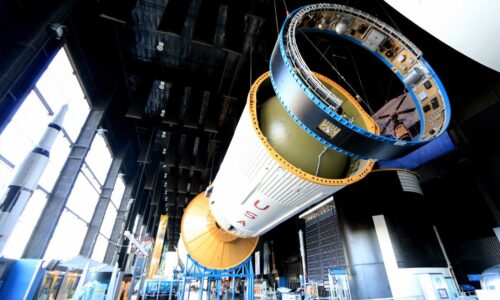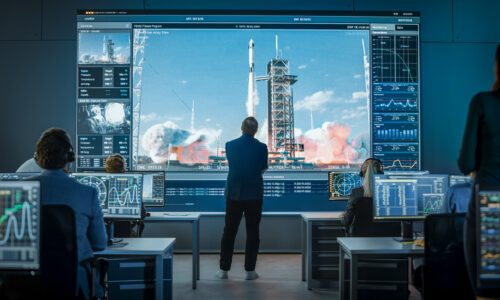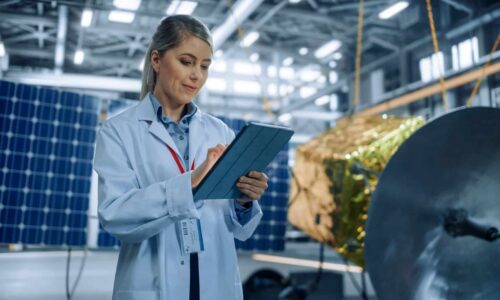New Space Economy
Limited Places
Deadline: 26 January
Register now to access the course.
- Space
- 523 (Registered)
 Download the Brochure
Download the Brochure
The Space Economy’s Next Giant Leap
According to Morgan Stanley, the $350 billion global space industry is projected to exceed $1 trillion by 2040, while PwC and Euroconsult forecast over 1 million new jobs in space-related sectors by the next decade. Today, more than 10,000 companies and 5,000 active investors are fueling this revolution, with over $6.2 billion in annual venture capital funding for space-tech startups.
Although the “space unicorns” often capture media attention, the real momentum comes from the 10,000+ companies and 5,000 investors driving a new wave of space entrepreneurship. Over the past decade, hundreds of startups have emerged, expanding opportunities in space technology, satellite services, and data-driven applications. The G20 now includes the space economy among its key priorities, reflecting its growing impact. Supported by public agencies and private ventures, the New Space sector is building scalable business models that connect science, investment, and policy—turning space into a thriving, accessible market for professionals and entrepreneurs worldwide
About the New Space Economy Course:
The online course, Space Economy, offers a comprehensive exploration of the business and commercial opportunities within the rapidly evolving space industry. This program explores the latest economic trends, challenges, and demands in the space sector. Designed to meet the growing demand for space education, the online program consists of five core modules. Students learn from an international faculty in inspirational learning environments worldwide, engaging with real industry challenges presented by experienced professionals and building career-ready capabilities.
Through real-world case studies and a systems-thinking approach, participants will gain insights into the New Space Economy, covering key aspects such as products, processes, business models, technology, and market dynamics. The course examines both upstream and downstream segments, from technical foundations to space policy, innovation, and market expansion with practical applications.
SEAC – Certificate of Completion
Advance your career in Space Economy with SEAC—first-prize winner of the Galileo Masters University Challenge. Incubated at ESA BIC Hessen with leading industry partners, you’ll earn a Certificate of Completion in New Space Economy.
The skills you will develop
Through this New Space Economy course, you will master in business management, strategies, and technology applications.
- Recognize the impact of New Space in non-space application verticals.
- Develop business and managerial skills to lead the Space sector with our Space Economy Program.
- Learn and develop new innovative strategies based on real-world business, explained by top lecturers.
- Proficiency in the application of New Space technologies and ventures in commercial domains.
Who Should Enroll in the New Space Economy Course
Participants of the Space Economy Program are:
- Engineers who want to understand the key drivers and technologies belonging to both the Upstream and Downstream segments.
- Engineers who want to complement their technical skills with business development and space policy.
- Managers interested in analysing the Space Economy trends and get an overall understanding.
- Entrepreneurs wanting to start up or scale up their business in the Space sector and aims at exploring future opportunities.
- Investors who desire to invest in new Space products and services, need to understand the technology and products.
Career Center
SEAC offers career acceleration with lifetime access to premium packages, and unlocking private job notifications through our Careers platform. Foster development through lifelong learning, mentoring and networking.
- Certificate of completion: Share your space economy certificate and make your CV unique.
- Accelerate your career with SEAC- Careers: Unlock the private job offers , and get lifetime premium package.
- Live Sessions with instructors: Twice a year, meet the instructor, and get career advices.
- Lifelong Learning: Lifetime updates in the courses, and loyalty discount of up to 15% to all Alumni.
- Mentoring Opportunities at SEAC, access mentoring and network opportunities regularly.
 Download the Brochure
Download the Brochure
Curriculum
- 6 Sections
- 40 Lessons
- Lifetime
- Section 1:Space Economy12
- 1.11.1. Space Economy Fundamentals
- 1.2Reading : What is value in the New Space Economy ? The end-users’ perspective on satellite data and solutions
- 1.3Reading: The long-term scientific benefits of a space economy
- 1.41.2. New Space & Commercialization in Earth observation
- 1.51.3. Public Investments and Political Involvement in the Space Sector
- 1.6Reading: Sustainable space for a sustainable Earth? Circular economy insights from the space sector
- 1.71.4. Private Investments, StartUp Ecosystem and PPPs
- 1.8Discussion with ESA directors: Developing interdisciplinary business models to enlarge the space ecosystem
- 1.9Reading: Assessing the full effects of public investment in space
- 1.10Space2Connect 2021 – keynotes: Space role & investment in economic recovery & future market opportunities
- 1.11Reading: The Astropreneurial Co-creation of the New Space Economy
- 1.12Quiz : Space Economy
- Section 2:Upstream and Downstream segments10
- 2.12.1. Examples of Non-Space Industries making use of Space Applications
- 2.2Reading: Downstream Space Activities in the New Space Era: Paradigm Shift and Evaluation Challenges
- 2.3Reading: Everybody’s Business to Know About Space: Cross-Disciplinarity and the Challenges of the New Space Age
- 2.4Φ-week – Downstream Industry for Digital Twin Earth. Part I
- 2.52.2. Technology Advances: Artificial Intelligence in Space
- 2.6Reading: The Advent of Artificial Intelligence in Space Activities: New Legal Challenges
- 2.72.3. Upstream and Downstream
- 2.8Φ-week – Downstream Industry for Digital Twin Earth – Part II
- 2.92.4. Innovation segments in Space
- 2.10Quiz : Upstream and Downstream
- Section 3:Space Policy8
- 3.13.1. Space Issues and Risk Management
- 3.2Quiz : Space Issues and Risk Management
- 3.3Space Law : 11 Questions with Marco Ferrazzani
- 3.43.2. International Space Law
- 3.53.3. Models of Innovation and TRL
- 3.63.4. Space Economy Numbers and Architecture
- 3.73.5. Space Standardisation
- 3.8Quiz : International Space Law
- Section 4:Space Economy Strategies3
- Section 5:Core Concepts in Space Industry Management6
- Section 6:Essay1
Lecturer
Dr. Lucia Fonseca de la Bella is the Faculty Strategic Project Manager for the Space Sector at the University of Surrey, where she leads the development of the new Surrey Space Economy Institute. In this role, Dr. Fonseca supports the University’s research and innovation strategies in the space sector, while also developing initiatives to strengthen partnerships with key industry players. Previously, she served as the European Space Agency's Business Applications Ambassador in the UK, a position in which she helped non-space companies incorporate space assets into their operations.

